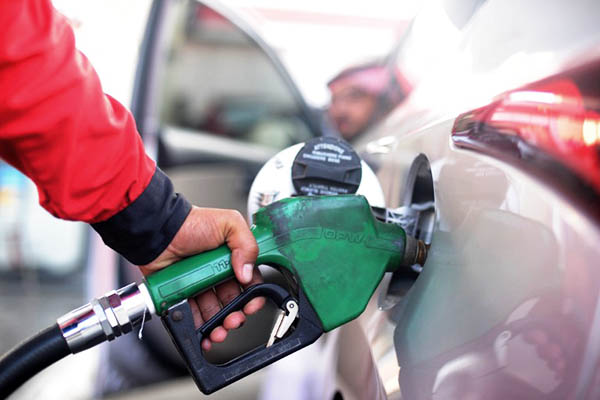
File photo. Amer Hilabi—AFP
Finance Minister Miftah Ismail on Thursday night announced a substantive Rs. 30/liter increase to the price of all petroleum products—a day after the International Monetary Fund (IMF) stressed on ending unsustainable fuel subsidies prior to the revival of a suspended bailout program.
According to a notification issued by the Petroleum Division, the new prices of petrol would be Rs. 179.86/liter; high-speed diesel Rs. 174.15, kerosene Rs. 155.56/liter; and light diesel oil Rs. 148.31/liter.
Addressing a press conference, the minister said that the new prices—the highest-ever immediate increase in fuel tariffs—reflected a reduction in the government’s subsidization of fuel products, but noted the consumer price was still less than it would be if the subsidy were removed altogether. “The government has been giving Rs. 86/liter subsidy on petrol, but we have only removed Rs. 30/liter,” he said, adding that the government was funding subsidies of about Rs. 56.71/liter on high-speed diesel; Rs. 37.84 on light-diesel oil; Rs. 21.83/liter on petrol; and Rs. 17.02/liter on kerosene.
He said the new prices would come into effect from midnight, adding that this was not as “easy decision” for the coalition government led by Prime Minister Shehbaz Sharif. However, he stressed, there was no other option but to reverse the unsustainable subsidy that had been announced by ousted prime minister Imran Khan in March.
Ismail claimed that the hike in petroleum prices would lead to stability in the financial markets, strengthen the rupee—which has been on a persistent decline against the greenback for several weeks—and boost the overall economy. To a question, he admitted that the new fuel prices would lead to “some inflation,” but added that the continuous decline of the Pakistani rupee against the U.S. dollar would have had the same effect and the only way to halt the slide was to reverse the subsidy.
“How can we afford [subsidies] that are costing three times more than [the cost of] running the everyday affairs of the government,” he said, adding that it was “injustice” to provide the same level of subsidy to both the impoverished and the country’s elite, who could afford to pay more. He emphasized that this meant the impoverished were subsidizing fuel for the luxury vehicles of the country’s elite. He said the consumption of petroleum products had increased by more than 20 percent since the subsidy were announced.
During his press conference, Ismail admitted that the IMF had refused to revive a suspended bailout until the government withdrew fuel and electricity subsidies, adding overall discussions with the lender in Doha had been very positive. “I can assure you that hopefully we will achieve a staff-level agreement,” he said.
To a question, he said Prime Minister Shehbaz Sharif would soon unveil a package to protect the poor from the petroleum price hike, stressing that it was unavoidable because of the agreements signed between the previous government and the IMF. “This will cost us political capital but interest of the state is supreme and the government is ready to sacrifice political costs; we cannot let the country drift toward default,” he added.
Mixed reactions
Hailing the decision, the Pakistan Business Council—in a posting on Twitter—said the withdrawal of the fuel subsidies was a “belated” step in the right direction. To conserve fuel, it said, the government should consider a reduced work-week, perhaps even work-from-home. “1 day/week saves $167 million/month with no political fallout,” it said of the option. “It would be appropriate to accompany the phasing out of general fuel subsidy with introduction of targeted subsidy for the most deserving,” it said. “That would limit any political fallout. Important that there are no U-turns from strengthening the solvency of the country,” it added.
Former prime minister Imran Khan, meanwhile, slammed the increase. “Nation starting to pay price for imported government’s subservience before foreign masters with 20 percent/Rs. 30/liter hike in petrol and diesel prices—the highest single price hike in our history,” he wrote on Twitter. “The incompetent and insensitive government has not pursued our deal with Russia for 30% cheaper oil,” he said of a “deal” that there is no verifiable evidence of.
“In contrast India, strategic ally of U.S., has managed to reduce fuel prices by Rs. 25/liter by buying cheaper oil from Russia,” he claimed, also erroneously, as India has reduced fuel prices by reducing its taxes. “Now our nation will suffer another massive dose of inflation at the hands of this cabal of crooks,” he added.
